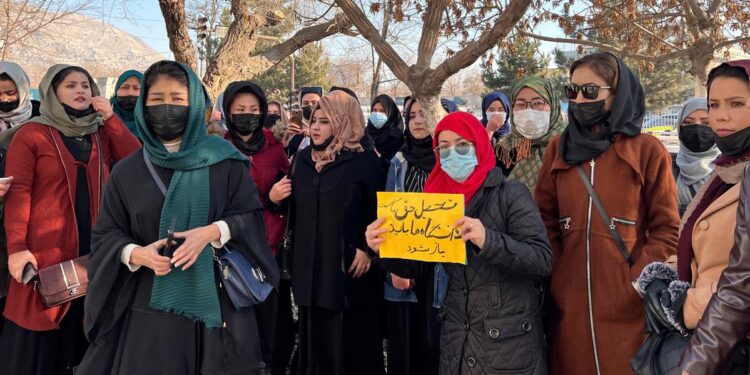by Miceál O’Hurley
KABUL — Afghanistan’s Taliban government further eroded what little international trust and good will still existed when they furthered their crackdown on the rights of women by forbidding them from working in non-governmental organisations. The prohibition comes quickly on the heels of the Taliban barring women from the classroom last month. As part of the negotiations that led to the United States withdrawal of forces from Afghanistan in 2021 the Taliban had pledged not to disturb women’s rights. The deal, brokered by the Trump administration in the waning days of his administration was widely viewed as reckless and toothless by the international community when signed. Time has proven them correct.

Contrary to earlier criticisms of the Obama administration’s use of announced troop draw-down timelines in Afghanistan, which Trump claimed invited aggression the Trump administration tied the incoming Biden administration to a specific drawdown on a strict timeline. Critics cite the Trump negotiated timelines as encouraging the spike in attacks by the Taliban on Afghanistan forces prior to the United States withdrawing from the rooftop of the Kabul embassy in a scene eerily reminiscent of their embarrassment in Saigon almost 50-years earlier. Since taking power in August 2021, the Taliban has repeatedly acted to undermine its pledges on women’s rights.
The prohibition on Afghanistan women working in NGOs follows Taliban claims women were not wearing head scarves correctly. NGOs operating in Afghanistan were notified of the Taliban’s orders on Saturday, 24 December via a letter from Qari Din Mohammed Hanif, the Taliban’s Minister for the Economy. The letter said organisation found in violation of the order would have its license to operate immediately revoked.
In November 2022, a spokesman from the Ministry for the Promotion of Virtue and Prevent of Vice claimed the ban was being introduced because people were ignoring gender segregation orders and that women were not wearing the required head scarf, or hijab. The Taliban also acted to ban women from public parks.
Only last week Ahmed Zia Hashemi, the Taliban Spokesman for the Higher Education Ministry texted Radio Azadi that universities in Afghanistan were closed to women, adding, “Universities are closed, so what are [women] doing in the dormitories?” Prior to the return of the Taliban government in August 2021 enrollment by women in Afghanistan Universities had reached the highest level since the Russian invasion of Afghanistan in 1979.

According to statements by Save the Children, the International Rescue Committee, the Norwegian Refugee Council and CARE these NGOs had decided to suspend aid operations in response to the Taliban’s announced ban. While not directly citing the further diminishment of what little rights women still retained in Afghanistan the NGOs cited an inability to function properly without specific staff. The four NGOs were disproportionately responsible for providing healthcare, education, child protection and nutrition services.
According to the International Committee of the Red Cross some 24 million Afghanistan citizens are in critical need of food and medical assistance. With staff of more than 3,000 females in Afghanistan the International Rescue Committee, whose staff in Afghanistan claimed the Taliban’s decision would have dire consequences for the health and safety of the Afghanistan people, “If we are not allowed to employ women, we are not able to deliver to those in need”.
Afghanistan is experiencing record levels of starvation, lack of access to healthcare and childhood disease and death rates along with those of the elderly are skyrocketing. The Taliban have reigned over a dismal economic decline due to mismanagement and sanctions imposed on Taliban leaders. Bank transfers are severely restricted. What little currency reserves Afghanistan possesses are rendered nearly worthless without access to world markets and banking systems. Foreign countries have frozen billions-of-dollars in Afghanistan assets held abroad. What little aid flowed into Afghanistan has gradually diminished due to continued corruption and human rights abuses from the Taliban government which has failed to maintain its pledges concerning the protection of women’s rights. In effect, the Taliban has placed the claim that head scarves are not being worn properly above the health and welfare of the Afghanistan people and functioning of the domestic economy.
 Gender inequality has played a large role in the food insecurity and economic demise of the Afghanistan domestic situation. In a 24 December Tweet by United States Ambassador in Kabul Karen Decker she wrote, “As a representative of the largest donor of humanitarian assistance to Afg, I feel I have the right to an explanation of how the Taliban intends to prevent women & children from starving, when women are no longer permitted to distribute assistance to other women & children”. In response, the Taliban government’s chief spokesman, Zabihullah Mujahid curtly replied, “All institutions wanting to operate in the country were obliged to comply with its rules and regulations.”
Gender inequality has played a large role in the food insecurity and economic demise of the Afghanistan domestic situation. In a 24 December Tweet by United States Ambassador in Kabul Karen Decker she wrote, “As a representative of the largest donor of humanitarian assistance to Afg, I feel I have the right to an explanation of how the Taliban intends to prevent women & children from starving, when women are no longer permitted to distribute assistance to other women & children”. In response, the Taliban government’s chief spokesman, Zabihullah Mujahid curtly replied, “All institutions wanting to operate in the country were obliged to comply with its rules and regulations.”

Penny Wong, Australia’s Minister for Foreign Affairs characterised the Taliban’s decision as “… an appalling decision”. Writing on Twitter, Wong claimed the Taliban’s banning of Afghanistan women from working in NGOs, “… seriously impacts the country’s ability to deal with a major humanitarian crisis”.
















































